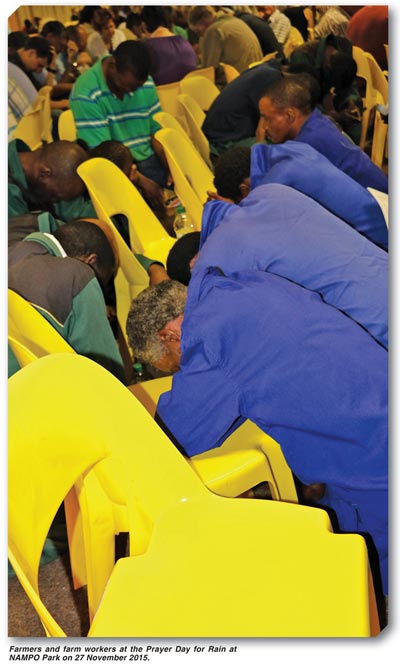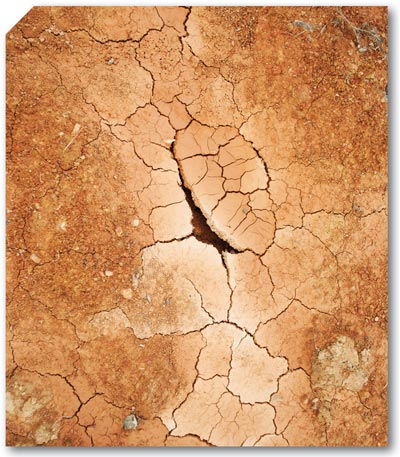March 2016
 Drought affects our lives in many different ways because water is such an important part of so many of our activities. We need water to live, and animals and plants do too! We need water to grow the food we eat and we need it for drinking, cooking, and washing and to make electricity… and so it goes on like a game of dominoes where one thing affects the next thing all the way down a long line – right down into the farmers bank account and his heart!
Drought affects our lives in many different ways because water is such an important part of so many of our activities. We need water to live, and animals and plants do too! We need water to grow the food we eat and we need it for drinking, cooking, and washing and to make electricity… and so it goes on like a game of dominoes where one thing affects the next thing all the way down a long line – right down into the farmers bank account and his heart!
The farmer – looking out at his lands worries about his family, his workers and his business commitments
By now most of us know how the country has been brought to its knees in the face of one of the worst droughts and cruellest heat waves in living memory! What a time of trial and testing this has been for all farmers in southern Africa. Having experienced two years of terrible conditions, some farmers are fortunate enough to have had some rain in time to save some crops; for others unfortunately, the rains came too late to save anything! Some will not have planted – and it will be very hard for those with nothing, to survive financially without some form of help. And yet…
Life goes on! And we must too! We need to survive both as businesses and as individuals with families and employees to care for. We have to do our very best to survive and to make plans for the new season – we can’t give up. The truth is we need to produce food for the population of our country and we need to survive so we can answer the deep calling to be custodians of the earth, to farm – mostly because we love to farm and don’t want to do anything else! Drought has come in the past but it has always been broken in the end – we need to make sure it doesn’t break us first!
Coping with the events of this past season has been like riding a roller coaster with emotions; up with hope, then down with worry – then into the depths of despair! Never before have our inputs and financial pressures been at greater risk because of drought two straight years in a row.
There is of course one beacon of hope this season: For those who have planted something and can nurture their crops to harvest time successfully, the excellent prices will make up quite considerably for the loss in yields! Our breakeven this year could be about 1,5 t/ha of maize whereas in the past for example with last year’s prices it was 2,5 t/ha.
When the season does draw to a close and we can assess more accurately what our harvests will look like, if there is something, it will be important to try to make one’s sums as early as possible to establish what our incomes will look like and what the shortfall could be. Communicate with input providers in good time to keep them up to date and informed about your unique set of circumstances. Remember there are many farmers in the same boat as you are and the service providers know and understand the agricultural environment. It is in their best interests to keep farmers’ businesses going as long as there is reasonable hope for recovering a viable business operation.
Banks and agricultural co-operatives are not farmers and they also do not want to farm – they will not be eager to displace any farmer except under extreme circumstances where they have lost confidence in the farmer’s ability to manage his way through the tough times or where it is clear to them that there is no hope for recovery.
If they can see that you as a farmer are making plans, keeping records, living frugally and are prepared to risk what you have back into the farming, then they are more likely to view your situation positively. Communication is the key to everything. Discuss your position, talk to experts and get their advice for the road ahead and most important too – keep lobbying the politicians and your farmer organisations and representatives to get politicians and decision makers informed about how drought aid can change everything for your business – and for food security in the country!
 The farmer – the man in the mirror
The farmer – the man in the mirror
Take a good look at yourself. Decide how you are going to respond to external conditions with your own reserve of internal strength and faith. Try not to sit still too long and do nothing. Try not to dwell on the negatives too long. Things are what they are! There is nothing we can do to change the heat wave or to stop the drought – we cannot make the rains fall or cause the grass to grow…Spend time in prayer and meditation every day to find that inner calm and strength. Focus on what you do have and on what you can do.
Are you still healthy and strong with a brain that can still make plans? Have you still got some surviving cattle that you can fatten up? Will you still manage to harvest something? It will be worth far more than in a normal year? Do things that require labour and not money. Keep busy and do things you don’t normally get around to doing. Tidy up the sheds and the farm yard. Check through all your implements; give them a coat of paint. This can be amazingly therapeutic for one’s soul!
Consider doing things around your home, repairs and maintenance that your wife has been nagging you to do. Happiness in the household helps and will make her feel more inclined to support you through the hard times. Think about small ways to make some money which will help the cash flow situation – even if it is mainly to keep your hands busy and your mind occupied – and of course every few cents help!
The bottom line: Don’t be too proud to work hard physically and to tell partners about your circumstances. Do whatever it takes to heal your business and feed your families. The energy you use will already make you feel focussed on your long term goal and fill you with real and passion to fight in a battle for survival.
The famous author Bill Bryson wrote: ‘There are only three things that can kill a farmer: Lightening, rolling over in a tractor and old age’. What about you? Will you fight for what you have and will you do everything possible to save your farm – or will despair and apathy win the battle? Are you going to stay indoors with the curtains closed or will you be found in your fields chasing the goats and crows, protecting every last grain of corn until harvest time like Mr Khumalo and Mr Ndhlovu near Ntabamhlope are this year? May your efforts be fruitful!
Article submitted by Jenny Mathews, Pula Imvula contributor
For more information, send an email to jenjonmat@gmail.com.
Publication: March 2016
Section: Pula/Imvula